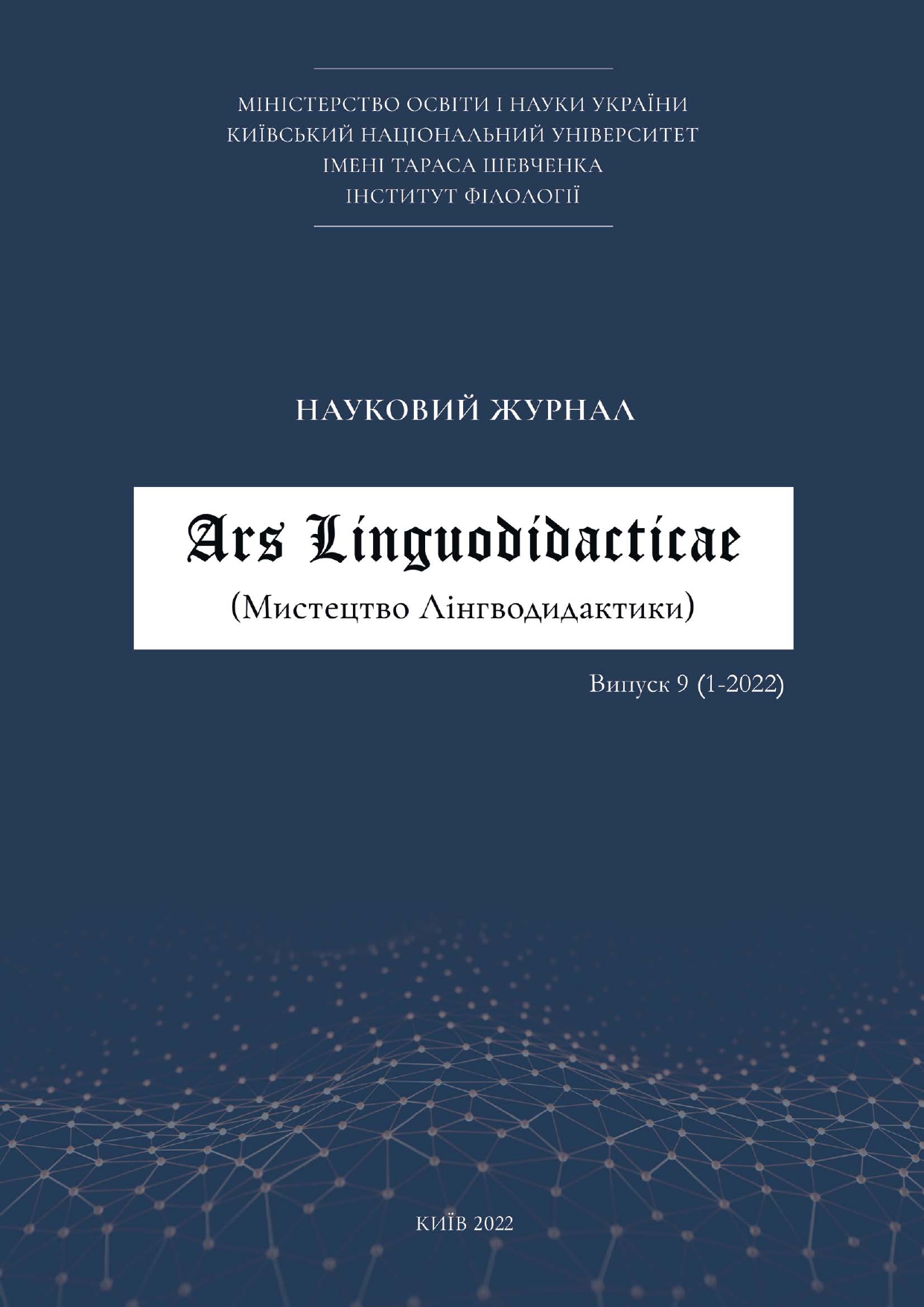Рольова гра як ефективний метод формування граматичної компетентності учнів 7-го класу на уроках англійської мови
DOI:
https://doi.org/10.17721/2663-0303.2022.1.05Ключові слова:
англомовна граматична компетентність, метод рольових ігор, учні 7-го класу середньої школи, міжкультурна комунікація, навчальний процесАнотація
У статті окреслено теоретичні засади формування англомовної граматичної компетентності у 7-му класі на уроках англійської мови методом рольових ігор. Зокрема, розглянуто визначення та компонентний склад англомовної граматичної компетентності та характерні особливості її формування; проаналізовано поняття рольової гри, її основні компоненти та вимоги, яким повинна відповідати ефективна рольова гра. Детальний науковий аналіз методу рольових ігор дав змогу авторам визначити його переваги та доцільність застосування для формування англомовної граматичної компетентності в учнів 7-го класу. З’ясовано, що метод рольових ігор, завдяки своїй комунікативній спрямованості, забезпечує підготовку учнів до міжкультурної комунікації у безпечному освітньому середовищі, а також допомагає вчителю організувати ефективний навчальний процес, підвищити якість знань учнів, забезпечити активність та інтерес школярів до опанування англійської граматики.
Посилання
Borshchovetska V.D., Ihnatenko V.D. (2018). Anhliyska mova: Navchalno-metodychnyi posibnyk dlia studentiv vushchuh navchalnuh zakladiv. Za red. O.O. Hrushko. Bila Tserkva.
Bihych O.B., Borysko N.F. ta in (2013). Metodyka navchannia inozemnyh mov i kultur: teoriya i praktyka: pidruchnyk dlia stud. klasychnyh, pedahohichnyh i linhvistychnyh universytetiv. Za zahaln. red. S.U. Nikolayevoi. Kyiv: Lenvit.
Chepurna M.V. (2006). Roliova hra – odyn z osnovnyh zasobiv osobystisno zorientovanoho navchannia. Anhliyska mova i literature, №22, S. 17-22.
Chernysh V.V. (2010). Orhanizatsiya ta provrdennia roliovyh ihor na urokah inozemnoi movy. Inozemni movy, № 4, S. 7-15.
Gebel S. F. (2009). Using the song in English lessons. Foreign languages at school, No. 5, P. 28 – 31.
Hirsh A. D. (1998). The Dictionary of Cultural Literacy: What Every American Needs to Know. Boston.
Kapitanchuk T.V. (2003). Roliova hra yak reserve pidvyshchennia yakosti ta efektyvnosti navchannia inozemnyh mov. Anhliiska mova I literatura, №31, S. 2-7.
Ments V. M. (1999). The Effective Use of Role-play: Practical Techniques for Improving Learning. Kogan Page Publishers.
Miroshnyk I.V. (2018). Poniattia inshomovnoi hramatychnoi kompetentnosti ta osoblyvosti ii realizatsii v pochatkovij shkoli. Molodyi vchenyi, № 2.1 (54.1), S. 99-103.
Nickerson S. (2007). Role-Play: An Often Misused Active Learning Strategy. The Professional & Organizational Development Network in Higher Education, Volume 19, Number 5. https://podnetwork.org/content/uploads/V19-N5-Nickerson.pdf
Orlovska O.V. (2012). Formuvannia gramatychnyh navychok u studentiv filolohichnyh spetsialnostei u protsesi vyvchennia practychnoi hramatykt anhliiskoi movy. Zbirnyk naukovyh prats Chmelnytskoho instytutu sotsialnyh tehnolohii Yniversytety “Ukraina”, № 6, S. 14-117.
Stechenko T.O. (2004). Formuvannia profesiyno-oriyentovanoi anhlomovnoi hramatychnoi kompetentsii maibutnuh filolohiv: dys. kand. ped. nauk: 13.00.02. Kyivskyi nats. lingvist. un-t.
Tryhub I.P. (2014). Fomuvannia hramatychnoi kompetentsii u studentiv nemovnyh spetsialnostei VNZ u protsesi vyvchennia angliiyskoi movy. Naukovyi visnyk mizhznarodnoho humanitarnoho universytetu. Ser.: Filolohiya, № 10, S. 74-77.
Vovk O. I. (2008). Suchasna stratehiya formuvannia anhlomovnoi hramatychnoi kompetentsii u studentiv-filolohiv. Psyholoho-pedahohichni problem silskoi shkoly, № 27, S. 5-10.
Zahalnoyevropejski recomendatsii z movnoi osvity: vyvchennia, vykladannia, otsiniuvannia (2003). Nauk. red. ukr. vydannia, doctor. ped. nauk, prof. S.U. Nikolayeva; per. z angl. O.M. Sherstiuk. K.: Lenvit.
##submission.downloads##
Опубліковано
Як цитувати
Номер
Розділ
Ліцензія

Ця робота ліцензується відповідно до Creative Commons Attribution-NonCommercial 4.0 International License.
Ця робота ліцензується відповідно до Creative Commons Attribution-NonCommercial 4.0 International License.
Політика охорони авторських прав відповідно до умов ліцензії: Creative Commons Attribution-NonCommercial (Атрибуція-Некомерційне використання) 4.0 Міжнародна (CC BY-NC 4.0).
Автори, що публікують свої статті в журналі "Ars Linguodidacticae" (журналі відкритого доступу) зберігають за собою такі права:
- Автори зберігають за собою права на авторство своєї статті та надають журналу "Ars Linguodidacticae" право першої публікації рукопису своєї статті на умовах ліцензії Creative Commons (CC BY-NC 4.0) Attribution License, яка дозволяє іншим особам вільно розповсюджувати опубліковану роботу з обов'язковим посиланням на автора оригінальної роботи та першу оригінальну публікацію в журналі "Ars Linguodidacticae". Інформація про збереження права на авторство надається на титульній сторінці статті.
- Автори зберігають за собою право укладати окремі угоди на неексклюзивне розповсюдження своєї статті у тому вигляді, в якому вона була опублікована в журналі "Ars Linguodidacticae" (наприклад, розміщувати статтю в електронних бібліотеках, архівах та каталогах або публікувати у складі інститутських збірників та монографій), за умови обов'язкового повного посилання на першу оригінальну публікацію в журналі "Ars Linguodidacticae".
- Політика журналу "Ars Linguodidacticae" дає змогу та заохочує розміщення авторами в мережі Інтернет (наприклад в інститутському репозитарії або на персональному сайті) рукопису роботи як до її подання до редакції, так і під час її редакційного опрацювання, оскільки це сприяє продуктивній науковій дискусії та позитивно позначається на оперативності й динаміці цитування статті.
Редакція журналу зберігає за собою видавничі права на:
- зверстані оригінали статей та весь номер журналу;
- оформлення журналу, а також оригінальні ілюстративні та додаткові матеріали;
- репринтні перевидання журналу в друкованому та електронному вигляді.
Політика охорони авторських прав провадиться відповідно до умов ліцензії: Creative Commons Attribution-NonCommercial (Атрибуція-Некомерційне використання) 4.0 Міжнародна (CC BY-NC 4.0).
Для отримання додаткової інформації, будь ласка, прочитайте повний текст Публічної ліцензії CC BY-NC 4.0
Creative Commons Attribution-NonCommercial 4.0 International License.

